Much like many long-lived institutions, the Middle Temple has had its fair share of members and staff who have acted in an unruly manner or disobeyed the rules. Such incidents have ranged from wearing a hat in Hall to breaking windows – events which were met with punishment and censure, and often penalties in the form of monetary fines.
Painting of Fountain Court by Joseph Nichols, 1738.
The Middle Temple was very involved in the education of students at New Inn, the Inn of Chancery associated with Middle, annually sending a Reader (until Michaelmas Term 1846) to provide five or six Readings and preside over moots. It was expected that “the double Readings be strictly observ’d in every house [any Reader that] shall refuse to perform the same he shall be fined, which fine shall not be under the sum of forty pounds." However, not all of the Readers were happy, or able, to complete this commitment and therefore, throughout the 1600s and 1700s, there are numerous accounts of Readers who took the punishment of a fine instead of Reading – even Robert Ashley, who later founded the Inn’s library, was guilty of this in 1616!

Order concerning R. Ashley's fine for not Reading [MT1/PPA].
It appears that many Readers fought back against this fine, looking to have it reduced. In 1789, when Mr Samuel Knight was fined £10 for not Reading at New Inn in the Trinity or Michaelmas terms, he argued against it and managed to get his fine reduced to only 6 guineas, equal to the cost of bringing in a Deputy Reader. Other Readers followed Mr Knight’s lead: a Mr Patrick Ward put forward a petition for the Society to remove the fine that he incurred from not performing his Reading at New Inn and in 1848, William Carmalt Scott, who was charged for not going to a Reading that did not happen, petitioned to have his fine returned to him.
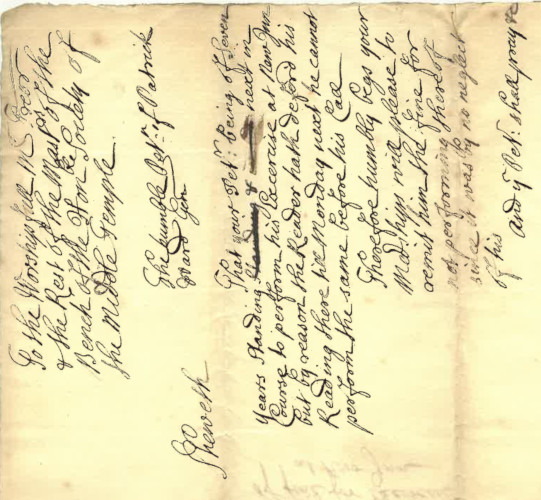
Petition of Patrick Ward to have the Society remit his fine, incurred by not performing his Reading at New Inn [Box IV - Bundle III - No. 86].
Middle Temple also elected Readers for its own students, the earliest records of one dating from the 1430s. These Readers were originally expected to carry out the cost of putting on a Reading themselves, however this made the role very time consuming and expensive, such that Charles II expressed his concern at the ‘disorders and great expense of Readings’ and limited the spending on Readings to £300. Even with this limit, the cost was still rather extravagant and therefore it was passed through Middle Temple Parliament that Readers could be given the option of paying a fine, rather than going through with the Reading.
For example, when Sir Francis Wythens was elected as Autumn Reader in 1680, after having been Called to the Bench earlier that year, Parliament ordered that he 'has liberty to read in the Hall one, two or three days, or not to read at all, at his pleasure... without expense', and if he paid a fine of £200, he would still have 'all the rights, privileges and benefits of a Reader, as if he had actually read'. This fine equates to around £22,000 in today’s money but, although this was a vast sum of money, it was often considered preferable to the cost and time commitment of physically hosting a Reading.
This practice of simply choosing to pay the ‘fine’ became the norm for Readers, continuing for nearly 250 years, making their life easier and opening an avenue through which the Inn was able to raise funds.
Armorial Panel of Francis Wythens, Autumn Reader 1680.
Fines were also imposed by the Middle Temple on members for offences such as unruly behaviour and rebelling against the legislation of the Inn.
One early transgression resulting in a fine occurred in 1512 when a member, Bray Cornwall, used ‘un-suiting words’ towards a fellow member, Trowte, leading to a fine of 5 marks and his (Cornwall’s) expulsion from commons (denied the right to dine in Hall). Later, in 1523, bad language was yet again the cause of a fine, when “Master Ryche and others complained of Holte for defamatory and seditious words used to them by the foresaid Holte.” We may never know the words Holte used as they were omitted from the records by the Under Treasurer of the time, but we do know that for this behaviour, Holte was fined 20 shillings.
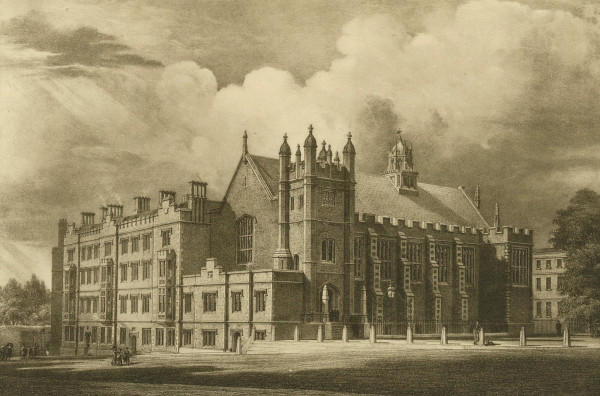
Engraving of Middle Temple Hall.
The Inn tried to impose a strict dress code for its members, which included the banning of hats in Hall and Church, a rule that was broken multiple times by disobedient members, resulting in fines. In May 1617, four members were brought before Parliament and fined after they wore hats, boots, and spurs in the Church and in Hall. The perpetrators refused to pay the fine placed on them and were put out of commons, only to then reappear back in commons later with their hats still on, for which they were then expelled. During another incident in 1619, a butler was sent with a message to “warn gentlemen in commons to forbear wearing their hats in Hall, because the Masters of the Bench would come into commons in the Hall at dinner on Wednesday.” However, the Masters of the Bar refused to comply with this, resulting in a fine of 40s being placed upon every Barrister who would not remove their hat. There were still issues regarding the wearing of hats in 1668 when a Mr. John Hanham was recorded in the Minutes of Parliament having been fined 10s for coming into the Hall for supper in a white hat, “being an indecent habitt.”
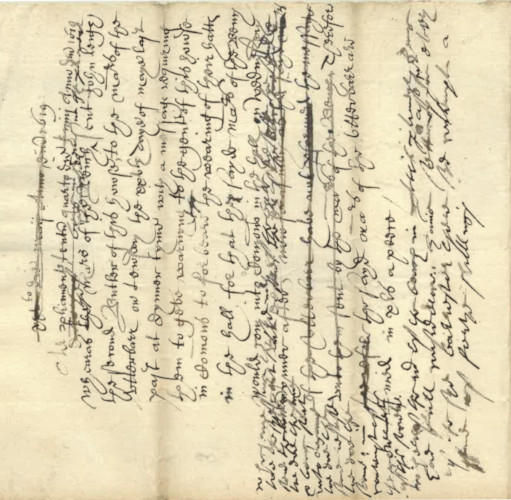
Order of fines to members for not removing their hats [MT1/PPA].
More trouble, leading once again to fines, erupted in 1694 when the authority of the Inn’s Parliament was challenged, after it ordered that members dining in Hall would be charged an increased cost of 8s 6d a week, contrary to established custom. It is recorded in the Minutes of Parliament that in retaliation to this, four members had “torn down orders from the screen, affronted and assaulted Masters of the Bench in the Hall and Parliament Chamber, taken away the Book of Public Acts and Orders, broken open the Hall, kitchen, and cellar doors, taken away the key of the Hall door and some of the plate, and set orders of their own contriving on the screen in the Hall.” Somewhat unsurprisingly, these rebellious members were expelled from the Inn, although they were assured that if they acknowledged their fault and petitioned the Masters, they would be readmitted upon payment of a £10 fine.
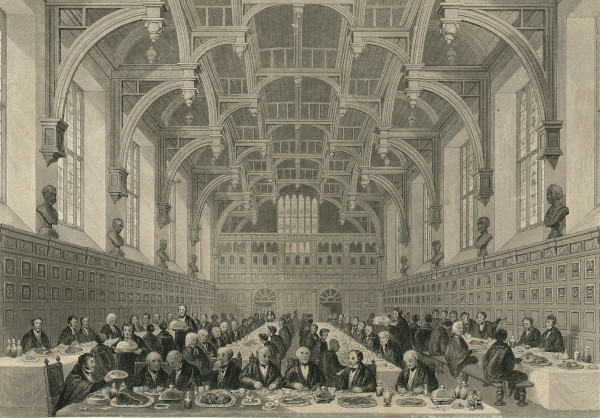
Taking Commons in the Middle Temple Hall c.1840.
Similar unruly behaviour was exhibited by a Mr William Callow, who was expelled from the Inn on the 25 May 1614 when he, along with two others, were found being disorderly, breaking the windows “of divers Benchers and gentlemen both of this Society and of the Inner House.” However, Callow was fortunate enough to be restored to the Inn on the condition that he acknowledged his fault before the Masters, paid a fine of £5 and covered the glazier’s bill for the broken glass.
Another issue at the Inn was the unsanitary practice of members throwing filth and water from their windows down into the streets below. In 1659, Mr Swanton and Mr Hillard were both given fines of 40 shillings for throwing “foul paper and water” from their windows. It is noted in the Minutes of Parliament, that any refusal to pay this would result in their chambers being padlocked up.
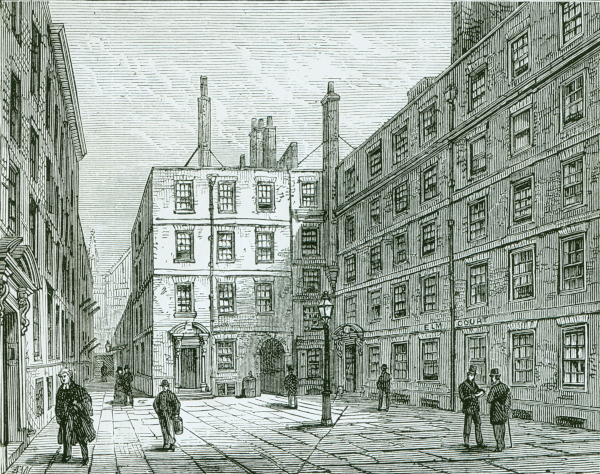
Lantern slide engraving of Elm Court, c.1900-c.1920.
In an attempt to prevent these misdemeanours, the Inn’s Parliament brought an order imposing a fine “on any chamber whence water or filth is thrown” on the 6 May 1687. However, this deterrent did not seem to prevent all as some confident members were fined in 1696 when they threw water out of their chamber’s window with the Treasurer in plain sight! Later, in 1717, a Mr Daniel was fined 40 shillings for throwing water out of his window in Elm Court, which landed on an unsuspecting Mr Ryder’s head. The passage of time seemed to do little to quell this issue, as it was still the subject of fines up until the 1830s, though thankfully it is no longer a problem within the Inn.
Fine for Mr Daniel for throwing water out of his window onto Mr Ryder's head [MT1/PPA].
It wasn’t just the Inn’s members who were subject to fines - staff also committed misdemeanours that resulted in them having to pay out. One more serious offence in 1756 was when a watchman who was supposed to be on duty at the Library was discovered to have left his post, resulting in books being stolen. It was “ordered that Cunningham the Watchman be fined in the sum of five pounds for his great neglect of duty and misbehaviour on Thursday night the 29 April when the library was robbed.”

Order for the watchman to be fined for neglecting his duty of watching the library [MT1/PPA].
In 1729, Henry Smith Garnum, the Chief Butler, was fined 40 shillings for a misdemeanour in which he was accused by a member, Mr. W. Mildmay, of refusing him his right and turn during a Candle Exercise which resulted in Mildmay not qualifying to be Called to the Bar. Garnum appealed twice against the fine and was eventually forgiven on his acknowledgement of his fault and promise that he would not be guilty of this again in the future.
Amongst the many treasures of its past, the Middle Temple has a rich history of misbehaviour – countless members and staff over the centuries having been subject to financial penalties from the Inn’s governing body for disobeying the rules and regulations set out to keep order within the institution. Thankfully, members no longer need fear expulsion for wearing the wrong-coloured breeches, nor watch out for chamber pots being emptied onto their heads.